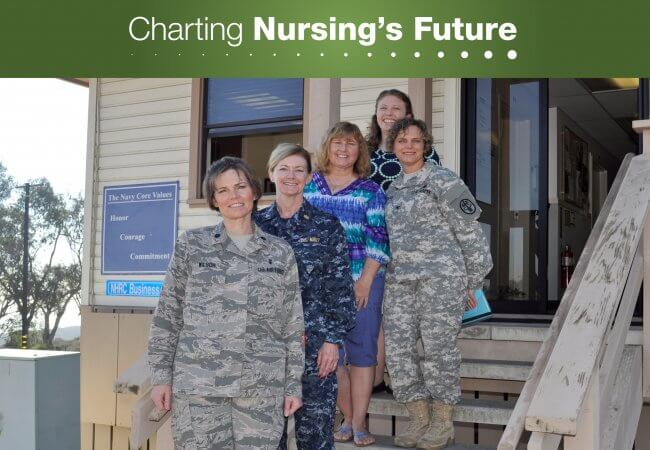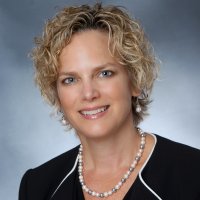
Nov 11, 2019
Nurse Scientist Highlights Needs of Female Service Members

Nurse Lori Trego (far right) founded the Military Women’s Health Research Interest Group in 2010. The group is sponsored by the TriService Nursing Research Program and composed of nurse scientists. Photo courtesy of Lori Trego.
“Active duty female service members have unique health care needs. It’s very hard to appreciate that if you’ve never experienced it.”
Lori Trego, PhD, CNM, FAAN, nurse-midwife and researcher, should know. She devoted much of her 25-year career in the U.S. Army Nurse Corps to studying the health of female troops. Austere environments and stringent physical demands affect the physical and mental health of both men and women, but, until recently, research didn’t differentiate between their experiences. Inspired by the stories of women who served in Bosnia, Trego began to examine systematically the impact of service on the well-being of female troops; and in 2010, she founded the Military Women’s Health Research Interest Group, which is composed of nurse scientists from the Army, Navy, and Air Force.
Now retired from the military, Trego continues to highlight the needs of female service members and veterans. She recently spent a year at the National Academy of Medicine as 2018-2019 NAM/AAN/ANA/ANF Distinguished Nurse Scholar-in-Residence, a program designed to assist outstanding nurse leaders in advancing health policy at the national level. In that role, Trego brought together a coalition of people to study the health of women veterans.
In honor of Veterans Day, Charting Nursing’s Future spoke with Trego about her work on behalf of veterans’ and service members’ health.
How has your active duty service influenced your understanding of military members’ health needs?
A pivotal moment in my career was when I was the director of a women’s health clinic at Fort Belvoir in Virginia. I wound up interacting with so many active duty women, and at the time they were coming back from Bosnia. They were saying how difficult it was in terms of hygiene and getting their periods under those conditions. That’s what inspired my PhD program of research, which looked at the phenomenon of menstrual suppression—using birth control pills to eliminate monthly bleeding—among active duty women. I realized there’s something different happening to women when they’re deployed that makes them want to suppress their periods, not to have cramps, not to have to worry about supplies.
There was a scale already out there to assess women’s attitudes towards menstrual suppression; I took that scale and modified it to make it military-specific. That led to looking at the impact of social ecological factors on their health. Do you have running water? What kind of social environment are you in? Are you in sleeping conditions where your cots are mixed, with both men and women? Do you have gender-specific bathrooms? Are you around a lot of women who are supportive? How does the health care system impact how they perceive their health and their feminine hygiene?
My studies branched out from menstrual suppression to feminine hygiene, because when I talked to the women, they told me, “What we’re really worried about is getting yeast infections.” They wanted to talk about urinary tract infections, yeast infections, and bacterial vaginosis, conditions that often arise when you’re in a challenging environment. They told me, “This is what really changes our lives. This is painful and irritating. It makes it difficult to do my job.”
How attentive is the military to women’s unique health care needs?

Lori Trego, PhD, CNM, FAAN, is a veteran of the U.S. Army Nurse Corps and a member at the University of Colorado Anschutz Medical Campus College of Nursing faculty. She researches the unique health care needs of female service members and veterans.
When I first started this, it was like swimming upstream. Even my dissertation committee was like, I don’t understand what you’re doing. But I learned that military commanders were extremely eager to get information on how to care for their women soldiers. When I reached out to the commander of a large infantry division and explained that I was a nurse scientist and wanted access to the women soldiers in his units, and explained what I was studying, he said, “We need this so badly.” I studied his soldiers, and when I had my data, I went back and did an educational program for them, at the commander’s request. I think there was a giant need for this information, and my research helped to fill the gap.
How did you use your position as NAM Distinguished Nurse Scholar to influence public policy?
I focused on female veterans. I designed a workshop at the National Academies of Sciences, Engineering, and Medicine, and we looked at women veterans’ health from a social determinants of health perspective. That is a little-explored angle.
We planned to bring together all of the people who might have some input into what’s going on at the intersection of structural and social determinants that are impacting women veterans’ health. The workshop would be a stepping-stone; it’s trying to narrow down the field to what is important so we can focus our resources and design a future study that will provide nonpartisan, unbiased, scientific advice for the government.
What have you learned about how nurses and nurse scientists can effectively influence public policy?
There are many ways that nurses can influence policy because nursing is still the number one most trusted profession. But you’ve got to have an in. When you call your senator’s office, introduce yourself as a nurse and ask to be connected with their health liaison. You want to develop a relationship and build trust. If we don’t have nurses ready, willing, and able to provide the input that legislators need, policy may be made in a vacuum, without that nursing perspective on what we need to care for people.
Nurses should also actively start making connections with their local governments. Do not underestimate what your local government can do for you because where federal policy leaves off, state and local governments pick up.
